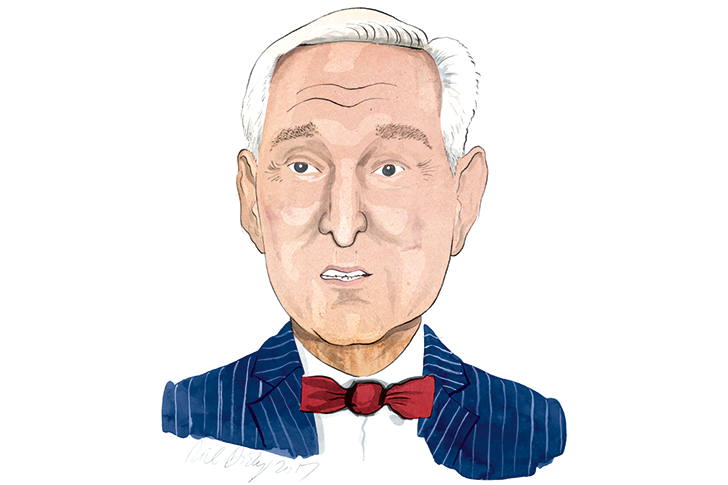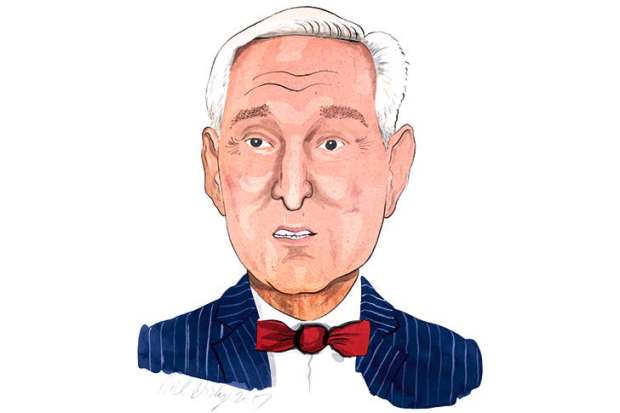Washington DC
Roger Stone — political consultant, agent provocateur, friend and confidant of Donald Trump — arrives for lunch with a bodyguard in tow. ‘I’ve had way too many death threats,’ he explains. He says he’s recovering from poisoning by polonium, a radioactive substance used to kill the Russian defector Alexander Litvinenko in London. Litvinenko, he says, had ‘a much larger dose, probably done by British intelligence’. But the British government named the Russian agents responsible, I reply. ‘What was the proof?’ he asks. ‘It’s all mirrors. You know that.’
Stone blames his ‘poisoning’ on ‘the deep state’, a term that in Trumpworld means the intelligence community. Trump has taken to Twitter to accuse the deep state of tapping his phone on President Obama’s orders. ‘This is Nixon/Watergate. Bad (or sick) guy!’ Stone has called for Obama to be ‘charged, convicted and jailed’. All this adds a layer to the tangled skein labelled ‘Trump and Russia’. At its heart is a simple charge: that Trump was bought or blackmailed by the Kremlin. Stone is accused of being a Russian conduit to Trump. Both men say they are victims of a conspiracy of lies by US intelligence agencies, a ‘silent coup’. Stone is an icon to a mass of Trump supporters who believe this is the hidden truth behind the President’s difficulties.
Stone slides into the restaurant’s wood-panelled booth. He’s in his sixties, white-haired, and wearing a bold pinstriped suit impeccably cut to make him look like a 1930s gangster. He lives in Florida and maintains a deep year-round tan. On that tanned flesh, beneath the crisp white shirt, right between his shoulder blades, he has, famously, a tattoo of Richard Nixon’s smiling face. Stone worked for Nixon and has seen ten presidential races. He likes to quote the famed Republican political strategist Lee Atwater on how to succeed in politics, and life: ‘Lay low, play dumb, and keep moving.’ He adds three corollaries, Stone’s rules: ‘Admit nothing; deny everything; launch counterattack.’ I imagine he’s given this advice to Trump; he sees the President ‘from time to time’, he says.
‘Access’ is the currency of Washington and it is hard to be certain how much Stone truly has. But he has known Trump for almost 40 years and he describes their history in his new book The Making of the President 2016. At the start of this relationship, you find the thread that Trump’s enemies say runs all the way to the Kremlin: money and organised crime. Stone was introduced to Trump in 1979 through Roy Cohn, the Trump family’s mobbed-up lawyer. Stone writes that he went to see Cohn at his offices and found him ‘wearing a silk dressing gown. His heavy–lidded eyes were bloodshot from a late night of revelry. Seated with Cohn was his client, “Fat Tony” Salerno, boss of the Genovese crime family.’ Some attribute Trump’s early success as a New York developer to Cohn’s mafia connections. They controlled the concrete. Stone tells me: ‘In his defence, the same people he bought concrete from also sold it to New York state and New York City. That was the only unionised concrete in the city.’
Wayne Barrett, a legendary muckraking New York journalist, told me before he died (of natural causes) that he had found ‘25 to 30 mob connections’ in Trump’s past. Today, the allegations are about the Russian mob, rather than the Italian-American mafia. Russian money is heavily invested — or laundered — through the New York property market. Trump won’t break your legs, I say to Stone, but isn’t he happy to take money from the guy who will? ‘Money is definitely important to him, yes,’ says Stone, drifting off into silence.
A source in the ‘intelligence community’ told me you could draw a line from Putin’s mafia state, through Russian organised crime, to Trump’s businesses. This connect-the-dots supposition is what the President and his allies denounce as malicious nonsense. But by their own standards — Obama wasn’t born here, Cruz’s dad killed Kennedy, British intelligence killed Litvinenko — it’s fair to ask about such speculation. Could Russian organised crime have supported Trump on behalf of the Kremlin? ‘It’s highly unlikely,’ Stone says. ‘The danger with the current laws and regulations, it’s too easy to prove, too easy to find, and that’s certain jail time — it’s not a grey area.’
Two months ago I wrote that the FBI was investigating exactly this. Several sources told me there was a secret intelligence court order to get the electronic communications of two Russian banks into the US. The New York Times later named Stone as one of the inquiry’s ultimate targets. ‘I don’t have any Russian contacts,’ he tells me. ‘No Russian clients. No Russian money. I didn’t speak to any Russians during this presidential campaign. The whole thing is a canard. If they have evidence to the contrary, go ahead: indict me. If you can’t, then it’s time for an apology because this is bullshit and it’s getting tedious.’
Stone similarly dismisses claims that the Kremlin has video of Trump with prostitutes in Moscow in 2013. ‘Zero chance,’ he says, adding that Trump is a germophobe and has a ‘well-founded paranoia’ about being taped while travelling. This repeats the President’s denials but Stone has an interesting story about that visit to Moscow, for the Miss Universe contest. It came, he says, from Trump’s head of security. ‘Their handler in Moscow, presumably reporting to the government although ostensibly working for the pageant, said to him, “We’re going to send some girls up to Mr Trump’s room afterwards for entertainment.” ’ The head of security posted guards outside Trump’s room, Stone tells me, and ‘It never happened.’ Still, this supports one of the claims in the Christopher Steele dossier: that the Kremlin was trying to co-opt Trump.
Last weekend, Trump and Stone issued their tweets accusing President Obama of ordering wiretaps at Trump Tower. I was disconcerted to find the White House citing my story of two months ago as evidence of this. Since Watergate, a president can’t order the wiretapping of an American citizen. It is possible, though, for Americans to be monitored as part of surveillance of a foreign entity ordered by the intelligence court — that seems to be what happened to Trump’s now-departed national security adviser, General Mike Flynn. Trump may have tweeted himself into a corner by calling for Congress to investigate a ‘wiretapping’ that was part of an investigation into his Russian ties. They may have to ask what was the ‘probable cause’ for any secret court order. Perhaps Trump didn’t see this implication. Or he just couldn’t restrain himself. Or the President is simply working from the Stone playbook: ‘Admit nothing; deny everything; launch counterattack.’
Got something to add? Join the discussion and comment below.
Get 10 issues for just $10
Subscribe to The Spectator Australia today for the next 10 magazine issues, plus full online access, for just $10.
You might disagree with half of it, but you’ll enjoy reading all of it. Try your first month for free, then just $2 a week for the remainder of your first year.














Comments
Don't miss out
Join the conversation with other Spectator Australia readers. Subscribe to leave a comment.
SUBSCRIBEAlready a subscriber? Log in